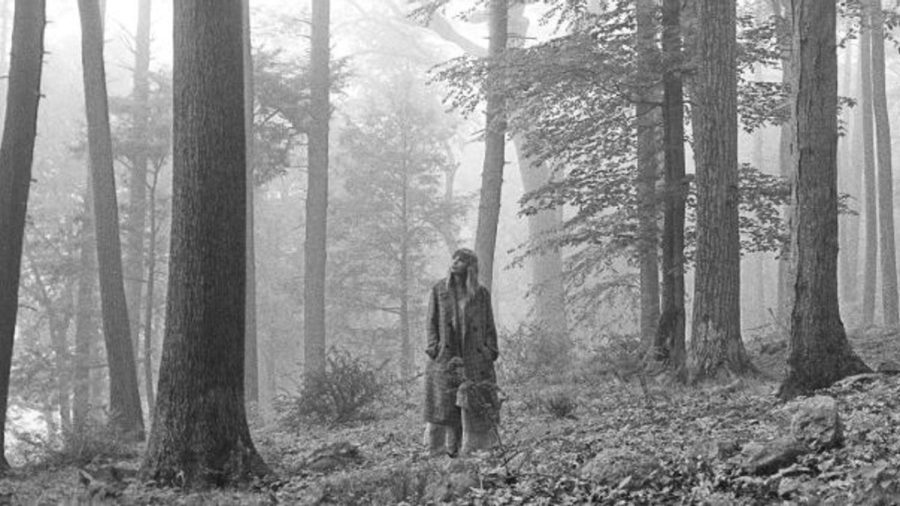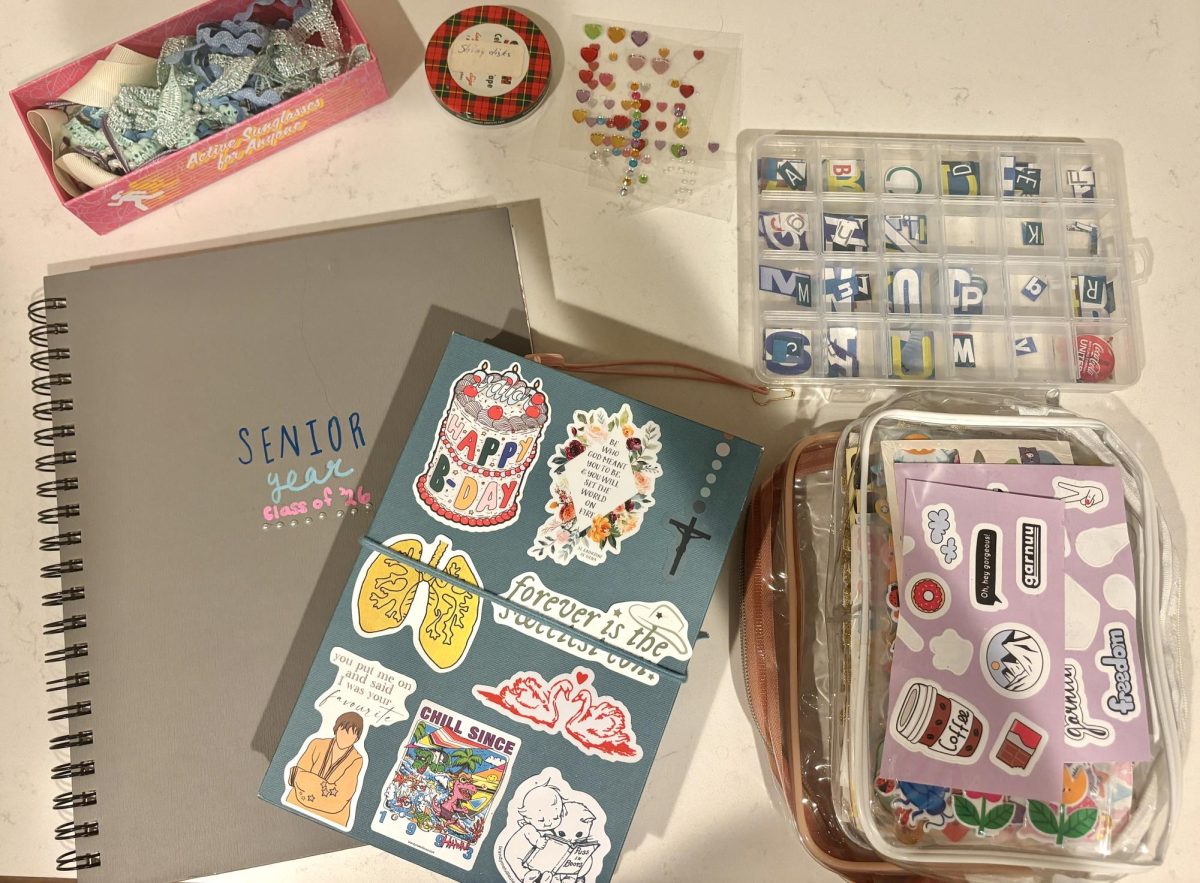A Definitive Ranking and Breakdown of the Songs on Taylor Swift’s Folklore
October 19, 2022
Fall is finally here, and along with it comes the annual resurgence of sad Taylor Swift songs in my Spotify rotation, along with those of countless other fans. In honor of fall officially beginning, I decided a complete breakdown and ranking of all the songs on Taylor Swift’s folklore, aka essential autumn listening, was in order. First off, folklore features some of the best songwriting I’ve ever heard, and it’s easily my favorite Taylor Swift album. Every single song on it is quality listening and a completely unique work of art and therefore ranking them is going to be painful. With that being said, let’s get started.
Number 17: “mad woman”
I knew almost immediately which song would be at the bottom of my list, which is less of an attack on “mad woman” as it is a compliment to the rest of the album. “Mad woman” is a vengeful ballad that bites back against sexism and the taboo on female emotion, specifically anger. Moody piano plays as Swift almost sneers lines like “And there’s nothing like a mad woman/ What a shame she went mad/ There’s nothing like a mad woman/ You made her like that.” Swift’s takedown of the branding of emotional or angry women as “crazy” is well executed and backed up with clever lines like “And you’ll poke that bear ‘til her claws come out/ And you’ll find something to wrap your noose around.” However, to me, “mad woman” just isn’t quite as creative as other folklore songs and doesn’t really elicit as much emotion from me as others do for me personally, and since something had to take last place, it unfortunately falls to “mad woman.”
Number 16: “epiphany”
I honestly love “epiphany” and it hurts to place it so low on my list. I could easily see the ethereal tune playing in a war epic or medical drama over a slow-motion shot of a soldier/doctor surveying the damage before them. In the song, Swift draws parallels between the experiences of soldiers in World War II to modern-day medical workers during the pandemic and details the harrowing experiences both undergo as they witness unspeakable things and do the hardest work there is. I do love some of the lyrics in “epiphany,” like “Only 20 minutes to sleep/ But you dream of some epiphany/ Just one single glimpse of relief/ To make some sense of what you’ve seen,” but the lyrics and songwriting overall just aren’t as impressive as Swift has shown herself to be capable of on folklore.
Number 15: “peace”
“Peace” offers up a deeply personal look into Swift’s love life as she describes the fact that with her highly-publicized and turbulent life, her lover could never have a normal, peaceful life with her. This is one of the few songs on folklore that would seem to draw mostly from her personal experiences, and that combined with poetic lines like “Give you the silence that only comes when two people understand each other/ Family that I chose, now that I see your brother as my brother/ Is it enough?” makes it quite special. Her breathy vocals combined with the minimal instrumentation add a serene air to contrast the unavoidable turbulence of her relationship described in the song. On almost any other Taylor Swift album, this would probably easily rank in my top ten songs, but folklore has such insane depth that “peace” somehow had to end up in the bottom three solely because, to me, the musical composition just isn’t as strong or complex as the other songs and because the energy of the song stays somewhat stagnant.
Number 14: “the 1”
I didn’t expect “the 1” to rank so low on my list when I set out making it. It’s wonderful in so many ways, and it’s a true tribute to the depth of the album that it ended up at number 14. It opens the album with Swift wistfully reflecting on a relationship that didn’t work out. Swift pensively wonders aloud “if one thing happened different, could everything be different today” and “if my wishes came true, it would’ve been you.” The bittersweetness of a relationship that just wasn’t meant to be is well conveyed in “the 1,” but even so the blandness of the track relative to the other folklore songs means “the 1” doesn’t quite live up to the standards of an album full of tracks that pull you under. The simple and laid-back nature of the song is refreshing, but it also means that it ultimately had to rank lower than other, more complex songs.
Number 13: “this is me trying”
To me, the most appealing thing about “this is me trying” is the honesty evident in the song. Not all of the lyrics may be about Swift, but many of them draw on her personal experience, and the painful sincerity in the theme of trying your hardest without being recognized as doing your best makes this track relatable for many. The lyrics overall aren’t as innovative as some other songs on folklore, although the bridge does feature some excellent lines in the form of “And it’s hard to be at a party when I feel like an open wound / It’s hard to be anywhere these days when all I want is you / You’re a flashback in a film reel on the one screen in my town.” Still, it’s definitely a personal favorite of mine due to the sheer authenticity and relatability of the song. Some songs about effort can come across as peppy, tone-deaf anthems blindly encouraging people to try harder, but “this is me trying” is a genuine song about the exhaustion of tirelessly persisting and the struggle to be recognized for it when you don’t have much to show for your efforts.
Number 12: “hoax”
In my opinion, “hoax” is one of the most underrated songs on folklore. Quite literally every line is sheer poetry, and in fact, the subdued, minimalistic nature of the instrumental accompaniment makes the song reminiscent of spoken poetry. Resigned melancholy practically drips from every word as Swift softly croons lines like “Don’t want no other shade of blue but you/ No other sadness in the world would do” about resigning herself to the deep flaws that come with a relationship that she can’t give up on. My only complaint regarding “hoax” is a common one: that it is a bit too subdued for what is technically the closing track of “folklore,” but at the same time, this same resignation is key to the message of the song. The best part of “hoax” without a doubt is the lyrics. If I were to rank the songs of folklore solely based on lyrics, “hoax” would likely place in my top three, but for now, it has to settle for lower.
Number 11: “the lakes”
Listening to folklore instead of folklore (deluxe version), which includes the bonus track “the lakes,” is never an option for me. I can’t really imagine why “the lakes” wasn’t initially considered deserving of a spot on folklore, as “the lakes” not only offers a much more satisfying conclusion to the album than “hoax,” but also because it’s frankly a beautiful song that could serve as an anthem to introverts everywhere. In the string-heavy “the lakes,” Swift expresses her desire to get away from all the pressures of the modern world and live peacefully in isolation save her lover by her side through poetic lyrics like “Take me to the lakes where all the poets went to die/ I don’t belong, and my beloved, neither do you/ Those Windemere peaks look like a perfect place to cry/ I’m setting off, but not without my muse” that qualify as standouts on an album full of songs heavy with lyrical genius.
Number 10: “exile”
If “the 1” is a bittersweet reflection on the what-ifs of a past relationship, “exile” is just bitter, and is more of a funeral mourning the death of it. This track features Bon Iver (AKA Justin Vernon) in a back-and-forth exchange with Swift as lovers reeling from the collapse of their relationship. The vocals on “exile” make it stand out from the rest of the album the most for me. Vernon and Swift form a stunning duet in this song, as Vernon’s deep, soulful voice complements Swift’s clear, bright vocals beautifully. The grimness and melancholy in their voices, especially Vernon’s, along with slowly building tension culminating in a fantastic bridge, make this song for me. Swift’s singing is excellent as always, but, honestly, without Vernon, “exile” would probably be a spot or two lower. It has excellent lyrics as well, and since many of the lyrics are repeated in the back and forth exchange, the quality of them was essential to the track, with standout lines like “you were my crown, now I’m in exile seeing you out” being repeated throughout the song. However, the repetition, while not tiresome, did push “exile” down in the rankings for me, as it is just slightly less inventive than Swift can be at her best.
Number 9: “the last great american dynasty”
Just listening to the opening seconds of “the last american dynasty” instantly fills me with a sense of freedom and adventure I have come to associate with the song, along with the lives of the two women described in the song. “The last great american dynasty” is a masterclass in storytelling, drawing parallels between the life of Rebekah Harkness, an American socialite and former owner of an oceanside Rhode Island estate known as the “Holiday House,” and the house’s current owner: Swift herself. We come to learn in the song that Harkness was a wealthy woman who led a highly-publicized life filled with controversy, much like Swift. The similarities don’t end there either, as Harkness “flew in all her Bitch Pack friends from the city” and “filled the pool with champagne and swam with the big names.” The Bitch Pack was Harkness’ group of debutantes and socialites that was the equivalent of Swift’s famed squad of celebrity friends, who have been known to party at highly-publicized events at Holiday House, even dipping in the pool, though perhaps not in champagne. The storyline and progression of “the last great american dynasty” is so exquisite, and that combined with the witty lyrics and refreshingly carefree and slightly mischievous mood was enough to land this song at number nine.
Number 8: “illicit affairs”
One of my most played tracks, “illicit affairs” is utter poetry in its depiction of a love affair that is “born from just one single glance” but “dies and dies and dies a million little times.” The other woman of the affair is the main subject of the song. She has to erase herself and make herself small over and over for the sake of her affair and only for “a dwindling mercurial high / a drug that only worked / the first few hundred times.” “Illicit affairs” depicts in heartbreaking detail the deep, resigned sadness she feels as a result having given herself over completely to a lover whom she knew was never really hers. It features a classic Taylor Swift bridge as well, one that will have you screaming “And you wanna scream / don’t call me kid / don’t call me baby / Look at this godforsaken mess that you made me “ out of nowhere and will basically rip your heart out and stomp on it.
Number 7: “seven”
“Seven” is a simultaneously nostalgic and heartbreaking song that details the friendship between Swift and a childhood friend of hers who faced domestic abuse from the point of view of a seven-year-old Swift, who can’t fully comprehend the extent of what her friend is going through. In an album full of songs about murder, doomed love affairs, war, and messy relationships, this song makes a strong case for the saddest one. The lyrics beautifully detail the pureness of childhood friendship, the nostalgia of summers in one’s youth spent outside with friends, the heartbreaking loss of innocence too early, and the hope that children cling to in the face of all else. The narrator being a child makes for lyrics that are deceptively simple compared to some of Swift’s other songs on folklore but are among Swift’s best lines and, frankly, I wouldn’t change a thing about “seven.”
Number 6: “my tears ricochet”
“My tears ricochet” is yet another example of why Swift deserves a spot among the best songwriter/storytellers of the 21st century. It features incredibly rich lyrics that paint a heartbreaking yet simultaneously vengeful narrative. Synthy, ghostly choir-like singing opens the song, putting forth an air of formality characteristic of a somber event. We soon find this to be all too true, as the lyrics gradually reveal that the song revolves around the funeral of the narrator, who watches as mourners and their lover, who eventually is revealed to be their murderer, bury them. Tension builds marvelously through the song in the lead-up to another incredible Taylor Swift bridge which peaks as Swift sings with fury “And you can aim for my heart, go for blood, but you would still miss me in your bones. And I still talk to you (when I’m screaming at the sky) and when you can’t sleep at night (you hear my stolen lullabies).” As if the original narrative wasn’t enough, the “stolen lullabies” serves as a reference to Scott Borchetta, who Swift has been in a public feud with over his record company’s ownership of the master recordings of her first six studio albums. Some also believe that the violent ending of the relationship in the song is a metaphor for the collapse of Borchetta and Swift’s relationship as well. At any rate, the exquisite lyrics and incredible expressiveness of Swift’s vocals in “my tears ricochet” place it at number six.
Number 5: “cardigan”
“Cardigan” was one of my favorite songs on folklore on first listen and although it may have slipped a few notches since, it remains among my top songs. It features some of the most vivid imagery on the album, and that’s saying something. “Cardigan” forms a powerful triptych with the songs “betty” and “august” that details the love affairs of teenagers James, Betty, and an unnamed girl. In “cardigan,” Swift counters the perceived naivety of the love affair between Betty and James with the deep knowledge and familiarity Betty (the narrator) has with James through repeating the lines “when you are young they assume you know nothing,” then describing the ways in which she knows their relationship is real and more than young love. This love eventually turns sour, as Swift croons in the bridge with some of her best ever couplets, among which “stepping on the last train, marked me like a bloodstain” and “but I knew you’d linger like a tattoo kiss, I knew you’d haunt all of my what-ifs” stand out. The tender piano and drum arrangement fits the song beautifully, but the luscious imagery is the real winner.
Number 4: “invisible string”
After seven-song-long run about heartbreak, abuse, murder, and brokenness, the eleventh song on folklore, “invisible string” is refreshing and almost surprising to hear as a wide-eyed, joyous ode in wonderment of love itself. Throughout the song, Swift recounts the twists and turns over the years that eventually brought her to her lover. The concept itself is delightful, but it’s executed to perfection as well with Swift’s lyrical genius showing again through lines like “A string that pulled me/ Out of all the wrong arms right into that dive bar/ Something wrapped all of my past mistakes in barbed wire/ Chains around my demons/ Wool to brave the seasons/ One single thread of gold tied me to you.” After other songs on the album describing in gut-wrenching detail the deaths of relationships, it’s refreshing to hear a song that gives pain from the past a purpose and restores faith that everything will work out in the end.
Number 3: “betty”
“Betty” is just such a delight to listen to. Continuing the story of Betty and James’s relationship, but from James’s perspective, Swift describes the regret James feels over cheating on Betty with a summer fling and his hopes that she’ll take him back. It’s one thing to write about your own experiences with depth and meaning, but James’s story is so painfully genuine that one would believe she lived this exact story herself, and every aspect of the song is just spot-on. On paper, I would’ve found James the villain for cheating on Betty, but in reality, Swift paints a picture of him as just a well-meaning teenage boy who made a mistake and is still figuring out what he wants but hopes so deeply that Betty will take him back. Swift’s lyrics detail his point of view with such heartfelt sincerity that it’s painful and makes it impossible to not root for him. “Betty” is a shining example of Taylor Swift’s creativity at its finest.
Number 2: “mirrorball”
Among an album full of folklore and narratives that are works of fiction, “mirrorball” stands out as an incredibly honest insight into Swift’s personal experiences. It’s my most played track on “folklore,” and if I honestly had to choose which track means the most to me personally, it would be “mirrorball.” Swift opens up in this track about how, as a performer, she constantly molds and remolds herself to please others. She does so through lines like “I’m a mirrorball/ I can change everything about me to fit in” that compare her persona to the ever-shifting surface of a mirrorball (or disco ball). She also describes the fragility of both her and the mirrorball (“I’ll get you out on the floor, shimmering beautiful, and when I break it’s in a million pieces”) and the fact that her audience takes pleasure in her brokenness and watching her “shattered edges glisten.” In addition to some of Swift’s best lyrics, the instrumental background consisting of twangy guitar and tambourines perfectly evoke a strong sense of a dance floor and even the tempo itself is reminiscent of a slowly-revolving mirrorball. The soul-baring vulnerability that Swift displays in this track makes it one of her best songs to date and flaunts once again Swift’s talent for turning her personal experiences into winning songs.
Number 1: “august”
“August” had to take the top spot. Every single element is just so spot on and it embodies the best of all the things that make folklore an incredible album: the incomparable imagination, the witty lyrics, and the flawless composition. It continues the aforementioned triptych with “betty” and “cardigan,” but this time details James and the unnamed girl’s summer fling from her perspective. All at once wistful, sweet, and sad, “august” is a tale about trying to hold on to an unrequited summer love that was always slipping away, as James’s love was never really hers. This theme of impermanence is reflected in many ways throughout: in the love affair, in the fleeting nature of late summer itself, and even in the vocal echoes that seem to be drifting away. Every single song on folklore contains some of the best lyricism by a modern mainstream artist, yet “august” features some of the best, if not the best, lyrics on the album. “August” also features what is hands-down the best bridge on folklore, where Swift sings “Back when we were still changing for the better/ Wanting was enough / For me it was enough/ To live for the hope of it all / Cancel plans just in case you’d call / And say ‘Meet me behind the mall’ / So much for summer love and saying ‘us’ / ‘Cause you weren’t mine to lose.” The musical composition itself is among the strongest on the album as well with almost shimmery sounding guitars and string instruments that perfectly add an end-of-summer wistfulness to the song. August is, quite simply, a masterpiece fit to crown one of Swift’s best albums.












